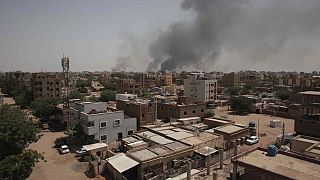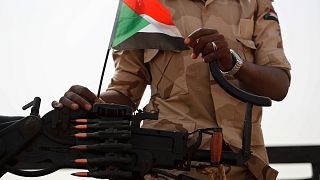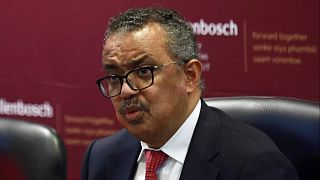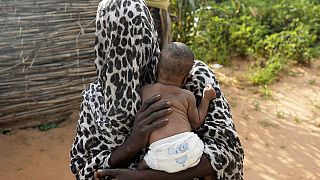Sudan
Sudan's embattled capital awoke Monday (Apr. 17) to a third day of heavy fighting between the army and a powerful rival force known as the Rapid Support Force (RSF).
Both entities aiming to seize control of the country. The power struggle between two generals has led to the death of many and left thousands panicked.
Engineer Ahmed recounts: "I was asleep. Suddenly I heard a lot of big sounds like bullets, rockets. I don't know what is it." [...] "I can't leave the house. It's very dangerous outside."
Since the infighting between General al Burhan who heads the army and General Hamdane Daglo who leads the RSF, broke Saturday (Apr. 15), airstrikes and shelling intensified in parts of Khartoum and the adjoining city of Omdurman.
The RSF grew out of the Janjaweed militia, formerly active in the Darfur region of the country and was later labelled a regular force.
Allies turned enemies now accuse each other of starting the fighting, and both claim the upper hand by declaring control of key sites, including the airport and the presidential palace -- none of which could be independently verified.
"You've got two highly armed forces who want to seize power. They've both paid lip service to the idea that they would respond to the Sudanese revolution by transferring power to civilians. But that has always proved elusive," the former UK ambassador to Sudan William Patey, analyses.
"'I suspect the we're going to see more fighting until either both sides."
The Arab League and the African Union on Sunday (Apr.16) held emergency meetings asking for the end of hostilities and a return to a political solution.
Speaking from Japan, the U.S Secretary of State called for a ceasefire.
"........ We've also been in close touch with partners in the Arab world, in Africa, in international organizations," Anthony Blinked said.
"There is a shared deep concern about the fighting, the violence that's going on in Sudan. The threat that that poses to civilians, that it poses to the Sudanese nation and potentially poses even to the region. There's also a very strongly shared view about the need for generals Burhan and Hemedti to ensure the protection of civilians and non-combatants, as well as people from third countries [...]".
Despite a humanitarian pause announced on Sunday afternoon, heavy gunfire was heard in central Khartoum and dense black smoke could be seen.
The World Health Organization warned that "several" of the capital's nine hospitals receiving injured civilians "have run out of blood, transfusion equipment, intravenous fluids and other vital supplies".
Doctors and humanitarian workers are sounding the alarm: under normal circumstances in Sudan, households are only supplied with electricity for a few hours a day. In some areas of Khartoum, it has been completely cut off since Saturday (Apr. 15), as has running water.











Go to video
Cuban women's volleyball team barred from Puerto Rico tournament after visa denial
01:49
Sudanese refugees in Chad face deepening humanitarian crisis
01:11
Sudan: U.S. sanctions over alleged chemical weapons use come into force
01:39
Driven to starvation, Sudanese eat weeds and plants to survive
02:20
John Cena and Idris Elba-starring action film "Heads of State" premieres in New York
01:00
Animal shelters in the US use live music to soothe anxious pets